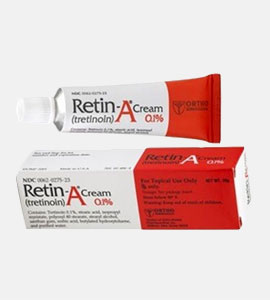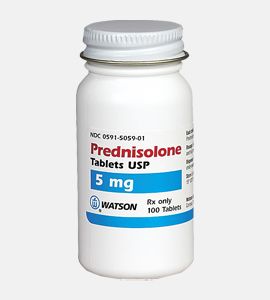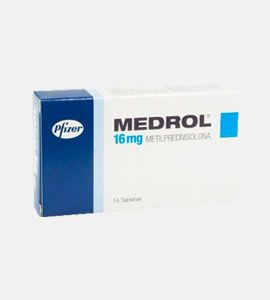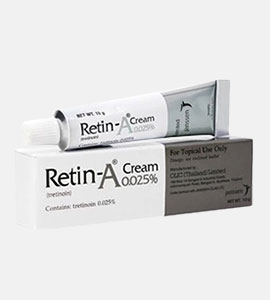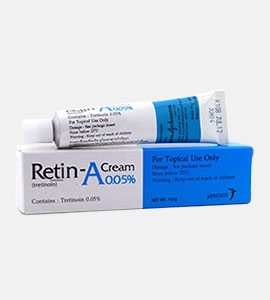
* Il prodotto immagine è a solo scopo illustrativo
Retin-A cream 0.05%

Disponibile

* I prezzi nel listino non si applicano a Svizzera, Svezia e Danimarca. Si consiglia ai clienti di effettuare ordine e il tuo agente ti ricontatterà con i prezzi aggiornati.

Ultimo acquisto 31 minuti fa
Questo prodotto è stato attualmente visto da 12 utenti.
Retin-A: Informazioni sull'uso, precauzioni ed effetti collaterali
Uso Comune
Tretinoina è la forma acida della vitamina A, comunemente utilizzata per trattare l'acne vulgaris e la cheratosi pilaris. Viene applicata anche in altri casi.
Dosaggio e Modo d'Uso
Applicare il gel su un viso pulito e asciutto. Distribuirlo uniformemente sulle aree trattate della pelle. Evitare di applicare il gel sulla pelle irritata. Potrebbero essere necessari 6-9 settimane per vedere l'effetto. Consultare il proprio medico o farmacista per maggiori dettagli.
Precauzioni
Quando si applica il gel sul viso, evitare le aree intorno agli occhi, alle labbra o altre aree sensibili. Informare il medico se si ha eczema o una sensibilità eccessiva al sole. Gli anziani possono essere più sensibili agli effetti collaterali del farmaco. Informare il medico se si è incinta o in allattamento.
Controindicazioni
Retin-A non deve essere utilizzato da pazienti che hanno dimostrato una reazione di ipersensibilità ad esso.
Possibili Effetti Collaterali
Gli effetti collaterali più comuni sono rossore, desquamazione, prurito e bruciore. Una reazione allergica molto grave è rara. Molte persone che usano questo medicinale non presentano effetti collaterali gravi. Consultare il medico o il farmacista per ulteriori dettagli. Se si notano effetti non elencati qui, contattare il medico o il farmacista.
Interazioni Farmacologiche
Prima di assumere Accutane, informare il medico o il farmacista di tutti i medicinali prescritti e da banco che si stanno assumendo. Retin-A non deve essere utilizzato con:
- Perossido di benzoile
- Acido salicilico
- Tetracicline
- Farmaci sulfonamidi
Consultare il medico o il farmacista per maggiori dettagli.
Dose Dimenticata
Se si è dimenticata una dose, assumerla non appena ci si ricorda. Se è vicino l'orario della dose successiva, saltare la dose dimenticata e riprendere il normale programma di dosaggio. Non assumere due dosi contemporaneamente.
Sovradosaggio
Se si pensa di aver usato troppo di questo medicinale, cercare immediatamente assistenza medica di emergenza. I sintomi di sovradosaggio solitamente includono dolore toracico, nausea, batiti irregolari e sensazione di vertigini o svenimento.
Conservazione
Conservare i medicinali a temperatura ambiente tra 20-25 gradi C (68-77 gradi F), lontano da luce e umidità. Non conservare i medicinali in bagno. Tenere tutti i farmaci fuori dalla portata di bambini e animali domestici.
Proprietà
La crema Retin-A è un medicinale a base di tretinoina, utilizzato per migliorare l'aspetto e la texture della pelle. Il suo ingrediente attivo, la tretinoina, è un derivato della vitamina A e viene usato per trattare l'acne quando applicato topicamente. Agisce su epidermide e dermis della pelle come una leggera esfoliazione chimica, accelerando la rigenerazione delle cellule della pelle, riducendo le rughe, le zone scure e disuguali e i danni causati dall'esposizione al sole.
Possibili Effetti Collaterali
Alcuni effetti collaterali di Retin-A possono essere gravi e devono essere segnalati immediatamente al medico. Questi includono reazioni allergiche come:
- Difficoltà a respirare, gonfiore in gola, lingua, labbra o viso, o orticaria
- Bruciore, formicolio, prurito, rossore, secchezza o irritazione della pelle (se grave e prolungata, deve essere segnalata)
- Decolorazione della pelle
Altri effetti collaterali includono:
- Sensibilità della pelle al vento, al freddo e alla luce solare (se persiste, consultare il medico)
Precauzioni
Si raccomanda vivamente di iniziare il trattamento su una piccola area della pelle e continuare se non appare irritazione. Evitare l'esposizione al sole o alla radiazione ultravioletta, specialmente all'inizio del trattamento con Retin-A; se ciò non è possibile, applicare sempre una protezione solare. Durante le prime settimane di trattamento, possono comparire problemi della pelle, poiché i piccoli cisti sulla pelle vengono eliminati più rapidamente del normale. Questa è una reazione normale della pelle e viene considerata un effetto collaterale. Se si è incinta o in allattamento, il medico deve approvare il trattamento con Retin-A.

Verificato da redattore medicale Dr. Josette Davignon
Rimodernato il: 25.11.2024




